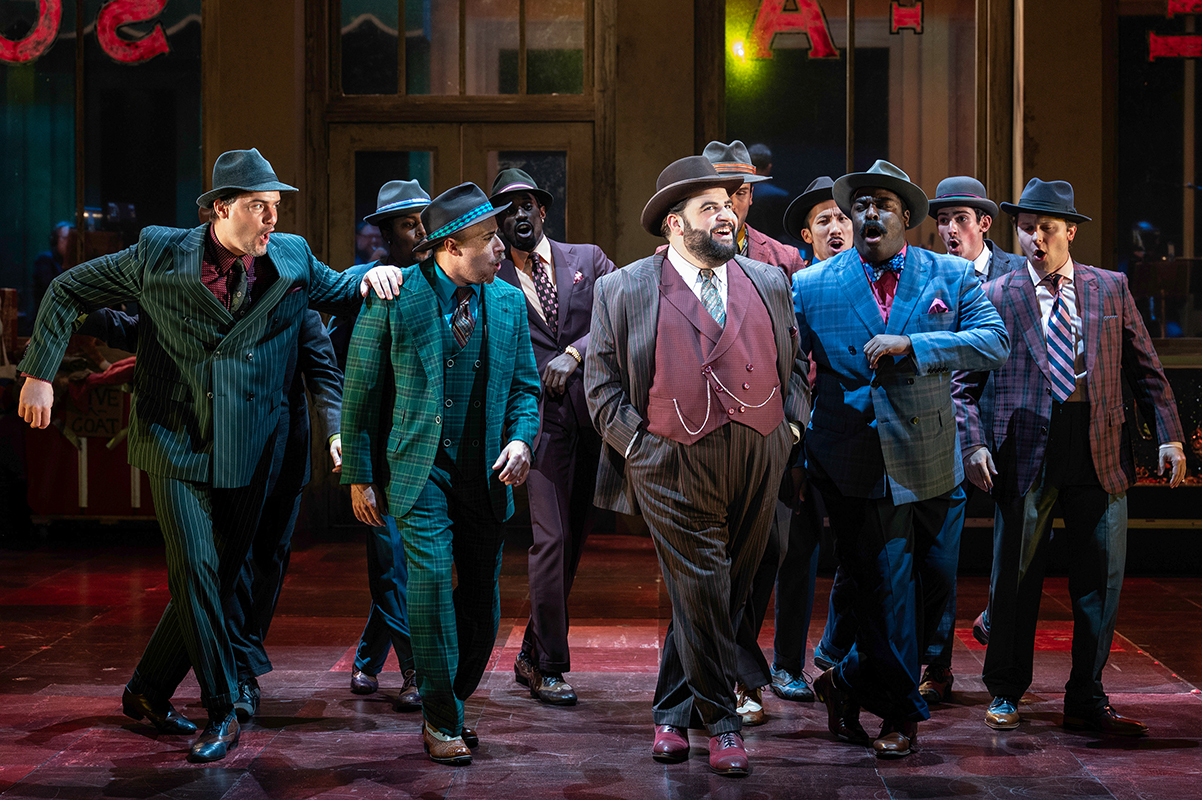Folger’s ‘Metamorphoses’ Is As Good As Gold (Review)
The Folger's "Metamorphoses" charts a fantastic voyage through myth and time, and in brilliantly engaging company.
By André Hereford on May 21, 2024 @here4andre

Life begins with a noise in the dark, a quiet rattle and hum that bursts into a joyful communal dance ended abruptly by violent separation.
From this first myth of creation, to a final heartfelt reunion, Psalmayene 24’s funny, sure-footed staging of Mary Zimmerman’s Metamorphoses at the Folger Theatre reaps the rewards of an inspired premise and well-directed company.
Based on Ovid’s epic tales of gods and man, the play condenses the original poem’s 15 books into a compendium of fables following fated figures like King Midas, and doomed lovers Orpheus and Eurydice. Psalmayene’s production further reimagines these myths as stories set in the African diaspora, performed by an all-Black cast (a first for the Folger).
Given a modern-day milieu, rendered with notes of African art and dance, American pop culture, and witty, accessible humor, this Metamorphoses remixes myths and morality with funk, soul, and hip-hop, and doesn’t miss a beat.
More to the point, the tight, versatile ensemble doesn’t miss a beat of Zimmerman’s archetypal drama, the adventurous direction, or Tony Thomas’ lively choreography.

Mika Eubanks’ boldly cheeky costumes also speak volumes for the show’s array of kings, queens, nymphs, deities, and celestial beings. Jon Hudson Odom, in a blue velvet blazer and jaunty gold crown, limns a gregariously greedy Midas, who’s left with a palpable sense of heartache once his golden wish has been revealed as a curse.
Gerrad Alex Taylor is a gas as the groovy god Bacchus, the foil in the Midas fable. In looks and attitude, Bacchus serves up a disco fantasy, abetted by the wonders Rueben D. Echoles works with wig and hair design.
Musically-gifted Orpheus evokes legends bigger than disco. Portrayed in another compelling turn by Odom, Orpheus is embodied with elements of Prince, Michael Jackson, and James Brown. But music and splendor can shift suddenly to misfortune. And, as Orpheus begs for the life of his beloved Eurydice (Billie Krishawn), Odom, for the second time in the evening, finds the heart in tragedy.
As Myrrha, cursed to pine romantically for her father King Cinyras (DeJeanette Horne), Renea S. Brown finds heart, and the delicate balance of tension and abandon, in the aptly unnerving tale of incest. Horne’s Cinyras doesn’t register the same gravitas, although the actor, as with everyone in the ensemble, has a shot to shine in multiple roles.
Taylor, for instance, follows up his amusing Bacchus with a delirious take on Erysichthon, a man who would ravage the earth or sell his own mother to satisfy his unwieldy appetite.
Yesenia Iglesias offers an ethereal Aphrodite in the shipwrecked love story of Alcyone (Renee Elizabeth Wilson) and Ceyx (Horne). And Manu Kumasi earns laughs for his determined Vertumnus, a not quite master of disguise in pursuit of nymph Pomona (Wilson).
Throughout the show, performer Miss Kitty lends mystery and a sprightly physicality to several roles, including as the silent but powerful god Hermes. As a water nymph, she ushers in a great flood with a dance, trailing her diaphanous blue fabric like waves crashing onto shore.
With such fluid ingenuity and rich imagery — persuasively assisted by William K. D’Eugenio’s lighting — the production traverses the heights of love and depths of loss. Ultimately, the mythical journey arrives at a satisfying end, shoring up the timeless pull of these immortal tales. “Let me die still loving, and so, never die.”
Metamorphoses (★★★★☆) runs through June 16 at the Folger Theatre, 201 East Capitol St. SE. Tickets are $20 to $84, with an Affinity Night performance on June 7 honoring the LGBTQ community.
Call 202-544-7077 or visit www.folger.edu.
More from Metro Weekly:
Guys and Dolls at Shakespeare Theatre Company Is Showstopping
Francesca Zambello delivers lavish Golden Age spectacle, standout musical numbers, and big Broadway flair.
By Kate Wingfield on December 22, 2025
Putting aside the curious question of why the Shakespeare Theatre Company has taken to staging musical theater -- this season it's Guys and Dolls -- the happy news is that director Francesca Zambello doesn't need to keep her day job (although let's hope she does).
She may be the artistic director of the Washington National Opera, but she's clearly got the eye, ear, and vision for a whole different kind of crowd. This is no-holds-barred Golden Age rom-com song-and-dance magic brought fully to life with some serious spectacle. From scenic designer Walt Spangler's mind-blowing industrial shop space, with all its peeling paint and careworn shop décor, to a live orchestra conducted with complete and utter flair by James Lowe, it's something to behold.
In Clay: A Revelatory One-Woman Musical at Signature Theatre
Boasting catchy tunes and a brilliant performance by Alex Finke, Signature’s "In Clay" shapes a fascinating portrait of an overlooked artist.
By André Hereford on December 22, 2025 @here4andre
Not since Hedwig and the Angry Inch have I so enjoyed a one-person musical about an internationally ignored female artist overshadowed by her famous male partner as much as I enjoyed Rebecca Simmonds and Jack Miles' enchanting In Clay.
Making its American premiere at Signature Theatre, following sellout runs in London, the jazz-infused portrait of early-20th-century French ceramicist and painter Marie-Berthe Cazin doesn't have too much else in common with hard-rocking Hedwig. Except that both shows are powered by a knockout batch of songs, and the galvanizing force of a woman reclaiming her time, her art, and her story.
Jay Kelly Review: Capturing the Unreality of Fame
Noah Baumbach's wistful Hollywood satire "Jay Kelly" questions the price of success in the motion picture industry.
By Zach Schonfeld on November 26, 2025
About halfway through Jay Kelly, Noah Baumbach directs a love scene. I don't mean that there is a sex scene (those rarely appear in Baumbach's cinematic universe, except the mortifyingly awkward kind). I mean that Baumbach himself appears onscreen, in a wink-nod cameo, as a fictitious filmmaker, choreographing an intimate scene between our hero, Jay Kelly (played in flashback by Charlie Rowe), and an actress playing his wife (Eve Hewson), who becomes his real-life paramour, though not real real-life, but -- ah, who's to say what's real anyway?
Baumbach has never been the sort of director to place himself onscreen, but the indulgence fits with a certain metatextual thread in Jay Kelly, a wry Hollywood satire and wistful character study infused with the director's signature familial discord. Here is a film about making sense of your life when, as Jay puts it, "all my memories are movies"; a film about sifting through the thin thread that separates public persona and private identity. How much of your life is real when millions of people know and adore you for playing someone else? And what about the real family you neglected to pursue those celluloid dreams -- is it too late to make amends?
Support Metro Weekly’s Journalism
These are challenging times for news organizations. And yet it’s crucial we stay active and provide vital resources and information to both our local readers and the world. So won’t you please take a moment and consider supporting Metro Weekly with a membership? For as little as $5 a month, you can help ensure Metro Weekly magazine and MetroWeekly.com remain free, viable resources as we provide the best, most diverse, culturally-resonant LGBTQ coverage in both the D.C. region and around the world. Memberships come with exclusive perks and discounts, your own personal digital delivery of each week’s magazine (and an archive), access to our Member's Lounge when it launches this fall, and exclusive members-only items like Metro Weekly Membership Mugs and Tote Bags! Check out all our membership levels here and please join us today!
The Magazine
-
Most Popular
 Where to Ring in the New Year in Gay D.C.
Where to Ring in the New Year in Gay D.C.  University of Oklahoma Fires Transgender TA Who Failed Student
University of Oklahoma Fires Transgender TA Who Failed Student  Most Sniffies Users Aren’t Gay, New Data Shows
Most Sniffies Users Aren’t Gay, New Data Shows  Trade at 10: Ed Bailey on His Career in D.C. Nightlife
Trade at 10: Ed Bailey on His Career in D.C. Nightlife  Erik Bottcher Drops Congressional Bid for State Senate Run
Erik Bottcher Drops Congressional Bid for State Senate Run  Adult Film Star Lane V Rogers, 31, Dies in Motorcycle Accident
Adult Film Star Lane V Rogers, 31, Dies in Motorcycle Accident  “Femboy” Tops PornhubGay Searches in 2025
“Femboy” Tops PornhubGay Searches in 2025  California Man Pleads Not Guilty After Gay Man Left in Coma
California Man Pleads Not Guilty After Gay Man Left in Coma  Jonathan Bailey Is 2025’s Highest-Grossing Actor
Jonathan Bailey Is 2025’s Highest-Grossing Actor  Guys and Dolls at Shakespeare Theatre Company Is Showstopping
Guys and Dolls at Shakespeare Theatre Company Is Showstopping
 University of Oklahoma Fires Transgender TA Who Failed Student
University of Oklahoma Fires Transgender TA Who Failed Student  Jonathan Bailey Is 2025’s Highest-Grossing Actor
Jonathan Bailey Is 2025’s Highest-Grossing Actor  Nicki Minaj Reaffirms Anti-Trans Views at Turning Point USA Event
Nicki Minaj Reaffirms Anti-Trans Views at Turning Point USA Event  Where to Ring in the New Year in Gay D.C.
Where to Ring in the New Year in Gay D.C.  Barry Manilow Reveals Lung Cancer Diagnosis
Barry Manilow Reveals Lung Cancer Diagnosis  The 10 Best Movies of 2025
The 10 Best Movies of 2025  Most Sniffies Users Aren’t Gay, New Data Shows
Most Sniffies Users Aren’t Gay, New Data Shows  Jacob Dickey Comes Up Lucky as Sky Masterson
Jacob Dickey Comes Up Lucky as Sky Masterson  Guys and Dolls at Shakespeare Theatre Company Is Showstopping
Guys and Dolls at Shakespeare Theatre Company Is Showstopping  Erik Bottcher Drops Congressional Bid for State Senate Run
Erik Bottcher Drops Congressional Bid for State Senate Run
Scene
Metro Weekly
Washington's LGBTQ Magazine
P.O. Box 11559
Washington, DC 20008 (202) 527-9624
About Us pageFollow Us:
· Facebook
· Twitter
· Flipboard
· YouTube
· Instagram
· RSS News | RSS SceneArchives
Copyright ©2025 Jansi LLC.














You must be logged in to post a comment.